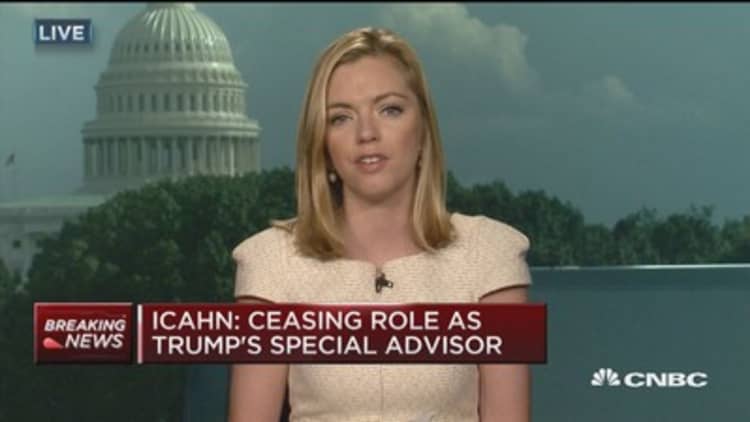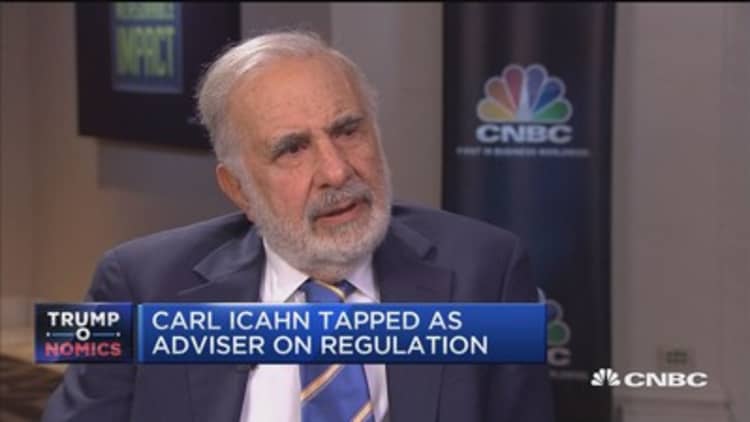
Carl Icahn resigned from his post as special advisor on regulation to Donald Trump ahead of a critical magazine article detailing his potential conflicts of interest and questioning whether he had acted illegally.
CNBC originally published an investigation on the matter in December.
The new New Yorker piece centered on how the billionaire investor, who announced his departure from the role on Friday, had been pushing to change part of a rule that has a negative impact on one of his energy investments.
Icahn said that he resigned from the role to avoid "partisan bickering" about his position. The billionaire investor said he did not want that scrutiny to affect the Trump administration's work on regulatory reform.
And in a personal defense, Icahn wrote in his resignation: "I never had a formal position with your administration nor a policymaking role. And contrary to the insinuations of a handful of your Democratic critics, I never had access to nonpublic information or profited from my position, nor do I believe that my role presented conflicts of interest."
"Indeed, out of an abundance of caution, the only issues I ever discussed with you were broad matters of policy affecting the refining industry. I never sought any special benefit for any company with which I have been involved, and have only expressed views that I believed would benefit the refining industry as a whole," he added.
Still, former White House ethics lawyers had told CNBC that Icahn's appointment to the informal role, given his stake in refiner CVR Energy, represented a conflict of interest and could have put him at risk of violating conflicts laws.
The rule in question requires refiners to blend ethanol, a renewable fuel, into gasoline. In an interview on CNBC's "Fast Money: Halftime Report," Icahn said the Environmental Protection Agency should immediately revoke part of the rule that requires refiners that cannot blend ethanol into gasoline to buy credits instead.
If Icahn's advice in his capacity as special advisor on regulation contributed to such a repeal, he would have inherently aided in removing a disadvantage for CVR Energy. Repeal of the regulation could have potentially boosted CVR's stock price and enrich Icahn.
The markets were anticipating Icahn would help shape rules that would benefit CVR: Shares of the company rose 11.5 percent after Trump named him to the role. Icahn Associates held 82 percent of CVR Energy's outstanding shares at the time, according to FactSet data.
The Trump team did not return CNBC's phone call or emails requesting comment for its original investigation into Icahn.
Earlier, the Trump transition team said Icahn "will be advising the President in his individual capacity and will not be serving as a federal employee or a Special Government Employee and will not have any specific duties."
Still, Norman Eisen, the former chief ethics lawyer to President Barack Obama, said before Trump took office that Icahn should beware because the situation may pose a violation of conflict of interest and other laws, some of which could carry a criminal penalty. He said Icahn's duties may go beyond informal advising, given that he has a formal title as special advisor, sweeping responsibilities and potentially influence over personnel choices.
"It appears that he may end up as a de facto special government employee. As such, he would be subject to the conflicts rules, including under 18 USC 208," Eisen told CNBC at the time, referring to a law that restricts people with a financial interest from advising the president.
"If so, that would make him potentially criminally liable if he worked on a repeal of the ethanol mandate that would boost CVR's stock price and enrich him. Of course, that's a lot of ifs, and we have to see what his actual conduct is," said Eisen, a fellow at the Brookings Institution.
In a statement to CNBC for its December investigation, Jesse Lynn, general counsel at Icahn Enterprises, said, "Mr. Icahn is well aware of his obligations under the law generally and with respect to 18 U.S.C. 208 specifically. He will follow the law as he always has."
He reiterated the Trump Team's message that "unlike a government employee, [Icahn] will have no official role or duties." He added that Icahn will not be in a position to set policy, but will instead offer suggestions.
In the New Yorker article, Lynn reiterates that Icahn held no official government role and was "not in a position to set policy."
Although in his resignation letter, Icahn wrote that he "had no duties whatsoever," the investor had given some indication of his agenda when speaking with CNBC in December.
Asked what specific regulations he would target, Icahn had said, "If you look at the EPA, which I've talked about quite a bit, there is nothing more absurd — and I've talked about this before — than this regulation concerning the obligated party, being refineries."
He said it was "insane" to require refiners to blend ethanol into gasoline. He also said it was "insane" that the credits for those who don't blend ethanol are traded openly. Trading in the credits can drive up the price.
In an answer to a follow-up question on when he expected regulations to be rolled back, Icahn said, "I believe that in the EPA, concerning regulations relative to refineries, you really need to roll back almost yesterday."
Richard Painter, a former chief ethics lawyer to George W. Bush and longtime critic of Trump, said before the president's inauguration that it would be a "huge conflict" if Icahn advised Trump on the ethanol mandate. In an email to CNBC, Painter noted that the Trump transition team had said Icahn "is not a government employee (they may be wrong on this if he acts like one) so it looks like they are saying the rules won't apply to him."
"As far as I'm concerned, I don't have any specific duties," Icahn said on CNBC. "What I'm going to be doing is basically talk to Donald as I've talked before."
Icahn has long been a critic of the Renewable Fuel Standard, which requires refiners to blend ethanol and other biofuels with gasoline.

Under the standard passed under George W. Bush's administration, refiners are required to either blend some ethanol into gasoline or buy credits called Renewable Identification Numbers, or RINs.
Large refiners that operate gas stations have an advantage in this system because they can blend the gasoline and send it to their pumps to be sold to consumers. That means they have to buy fewer RINs.
But smaller merchant refiners like CVR Energy do not have blending operations and instead sell gasoline in bulk to traders. As a result, they have to buy RINs to comply with the ethanol mandate.
Icahn has said he opposes the regulation because it stresses refiners' finances and prevents them from investing in their facilities. He has warned that the cost burdens associated with RINs could push some refiners into bankruptcy, which would lead to higher gasoline prices.
On Dec. 22, the day after Icahn was formally declared a White House adviser, the price of the credits dropped. Then, on Feb. 27, news leaked that Icahn had struck a deal with the Renewable Fuels Association to change the ethanol blending requirement. That sent the price of credits down more, and it fell further when word leaked that an executive order on ethanol blending was imminent.
Previously the Renewable Fuels Association had opposed any changes, the New Yorker reported. The association's head later said he was told by Icahn that the blending point would be changed whether the association objected or not, so he agreed to take a deal to his board.
Early in the year, CVR actually was selling renewable fuel credits, the magazine wrote. It was able to buy them later at a discount to meet federal requirements, according to the story.
A day after news of the deal with the Renewable Fuels Association, the White House denied there was any plan to change the renewable fuel requirements, and no such change was made, according to the magazine.
—The Associated Press and CNBC's Christine Wang contributed to this report.



